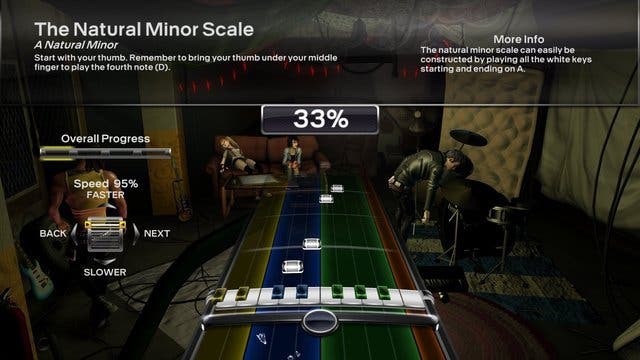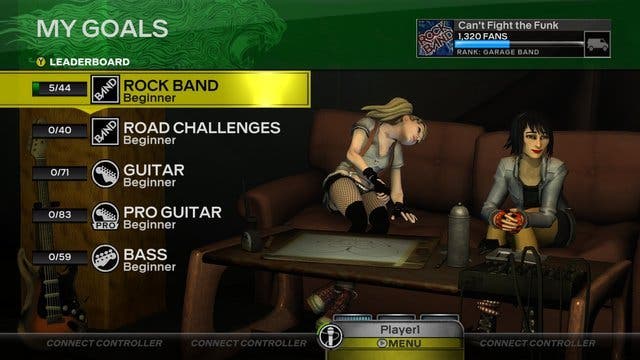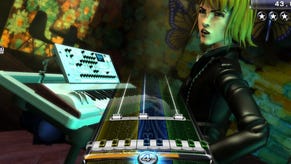Rock Band 3
Finished symphony.
Of the 83 songs on-disc, not all feature a keyboard part, nor are those included all terrifically interesting to play. But there are some wonderful highlights: the frenzy of Elton's Saturday Night's Alright For Fighting; the simple beauty of Imagine; the shameless cheese of Dire Strait's Walk of Life; and, as mentioned, 'the one off of Back to the Future'.
Sadly, if unsurprisingly, keyboard parts are not automatically added to existing songs in the Rock Band Store and your collection. On the flipside, the range of music available should widen considerably over time to embrace keyboard/piano-led tracks.
Joining the keys in the new range is the Pro Guitar, which weighs in at an eye-watering £130, only available separately. Two versions of this are coming, one an actual guitar with strings, the other – which I've been playing with – a bewildering creation that replicates every available note on the fretboard with a discrete button. Which means a mesmerising 102 in total. It is the Anti-Wii.
The buttoned version is a remarkable piece of kit. It feels much more realistic than it looks like it should, and if you know your way around the instrument it's a doddle to play chords, slide up and down the neck and pick out – via the satisfyingly realistic string box - individual notes.
Proof of concept: the first time I tried Pro guitar was a disaster. I couldn't keep up with let alone decipher the visual cues (effectively a new language to learn).
So I paused it. Cranked up the difficulty, out of morbid curiosity, from Medium to Expert and restarted. It was a strummy song and I recognised the chord names scrolling down the side of the note highway, if nothing else. I stopped attempting to follow the symbols and started playing the chords as I knew them. It worked!

Pro Mode – available for drums, guitar and keys – is Rock Band 3's real 'big idea'. Evolving the basic drum training of earlier versions and taking the concept implied by the series' title to its logical conclusion, Harmonix is claiming nothing less than to have created a game that will teach you to play the instruments of a real rock band. And you know what? It has.
The Pro instruments at once dramatically expand the potential of the game and fundamentally change the approach required to play and enjoy it. Make no mistake, the learning curve is cliff-steep. And even if you eventually scramble up the cliff, you'll still feel like throwing yourself off it from time to time.
But the pay-off for investing the time required is massive: what you learn in the game will work outside of it.
At school I was taught over many years to play loads of instruments: piano, trumpet, trombone, euphonium. And yet the only one I still play with any regularity is the only one I learned off my own back: guitar. (Why guitar? You try impressing girls with a small tuba.)
Yes, I had a solid musical grounding, which obviously helped. But the main way I learned, and which Rock Band 3 understands by design, was simply to play along to music I liked, over and over and over until, little by little, it started to fall into place.

Using a Pro instrument, you can learn any song on the disc. Training Mode breaks tracks up into manageable sections, providing visual and text descriptions of what and how you need to play.
Moreover, the game features a massive array of instrument-specific tutorials, offering up scores of exercises designed to teach you the relevant basics of music theory and challenge you to improve your technique. While not exhaustive, the range of lessons is impressive.
If you've ever had lessons, you'll know the excruciating pain of scales practice – the waterboarding of musical tuition. Shrewdly, Harmonix has encouraged learning by tying it into the overall Goal structure. You'll unlock Achievements, boost your band's fame and climb leaderboards just as you would anywhere else in the game. If only life was like that.
One more thing to note: your virtual teacher is an unforgiving bastard. Mistakes in training are not tolerated. You cannot complete an exercise until you have played each section flawlessly.
It's similarly demanding in the main game, where small mistakes are punished, and lazy flaws in technique that may have developed over the years are ruthlessly exposed.








